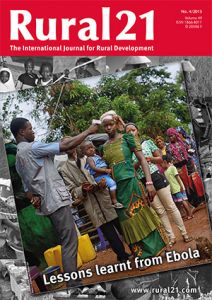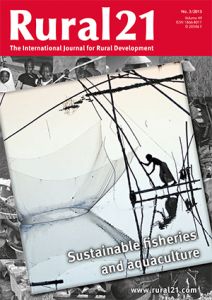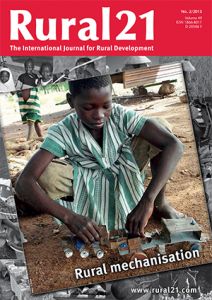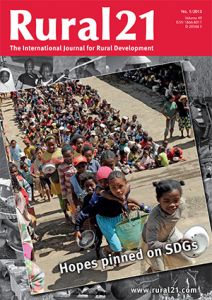Jahrgang 2015
-
Rural 21 (engl. Ausgabe 4/2015)Focus 4/2015: Lessons learnt from Ebola
It is now two years ago that a two-year-old boy in Guinea called Emile caught the deadly Ebola virus and died. In next to no time the disease then spread to the neighbouring countries of Sierra Leone and Liberia. So far, it has infected 25,601 persons and led to 11,300 deaths in the three countries. But these are only the official statistics – the true number of victims is thought to be considerably higher. How could the crisis assume such dramatic proportions? The authors in this edition give accounts of their analyses on Ebola outbreak and response, but also of their personal experiences during their work in the countries concerned. Erfahren Sie mehr -
Rural 21 (engl. Ausgabe 3/2015)Focus 3/2015: Sustainable fisheries and aquaculture
In the debate about food security and poverty alleviation the fishery sector is mostly mentioned only in passing, if at all, even though at least one billion people depend on fish as the main source of animal food and at least one-tenth of the world population depend for their livelihood on fisheries and aquaculture. The World Bank and FAO estimate that demand for aquatic food will continue to rise. But around one-third of all fish populations are already overfished. Large-scale illegal, unreported and unregulated fisheries worsen the problem, and also contribute to loss of revenues, employment and fish supplies for local populations. Numerous other factors, such as environmental pollution, littering and increasing extraction of raw materials from the seabed, and also natural disasters and climate change have an impact on the state of the oceans. How can we succeed in using aquatic resources sustainably while at the same time ensuring that inequalities in access to them are eliminated so that small-scale fishers and aquaculture communities also benefit from the value chains? Our authors present the challenges, lessons learned and approaches to solutions from the point of view of development cooperation, civil society and science. Erfahren Sie mehr -
Rural 21 (engl. Ausgabe 2/2015)Focus 2/2015: Rural mechanisation
It’s easy to find arguments in favour of raising the degree of farm mechanisation. People’s living conditions improve, for the drudgery that also makes farming so unattractive for young people is no longer necessary. Standardised, optimised processes along the entire value chain raise the quality of primary and processed goods; harvest and post-harvest losses are reduced. Furthermore, a services sector develops around production, marketing and the use and repair of technical equipment that creates jobs, boosting the economic power of rural areas. And last but not least, coupled with higher purchasing power, the quality and volume of food produced also improves the food situation of the population. However, even the finest technology will be of no use if it is not applied or not properly employed – perhaps because its operation or maintenance is too complicated, because it doesn’t fit into the societal context or sections of society – often women – are barred from using it, because farmers do not benefit from it or simply because they lack the (financial) resources. Our authors show why and how the individual regions throughout the world have developed differently in terms of mechanisation and which concepts are really forward-looking, i.e. sustainable with a view to climate change and scarce natural resources, and that are above all also suitable for smallholders. Erfahren Sie mehr -
Rural 21 (engl. Ausgabe 1/2015)Focus 1/2015: Hopes pinned on SDGs
When the international community of states adopts the Sustainable Development Goals (SDGs) in New York in September 2015, the Millennium Development Goals (MDGs) will once and for all be a thing of the past. Although it cannot be denied that the MDGs have been successful – absolute poverty has been halved since 1990, and 90 per cent of children in developing countries are today completing primary education – the positive results should not distract attention away from the weaknesses. The MDGs have neglected one important factor in poverty reduction, that of empowering people, as they have the specific conditions in conflict-affected countries and the aspect of environmental sustainability. In addition, they have continued the traditional paternalist aid relations between the Global North and the Global South instead of abandoning them. Therefore – and also because power relations in the world have shifted immensely since the MDGs were adopted – countries agreed to replace the MDGs by a new set of goals. In this edition, our authors explain the essence of these Sustainable Development Goals, what is expected of them and, above all, what is needed for their ambitious agenda to be implemented. After all, the latest proposal has 17 goals and 169 targets … Erfahren Sie mehr






